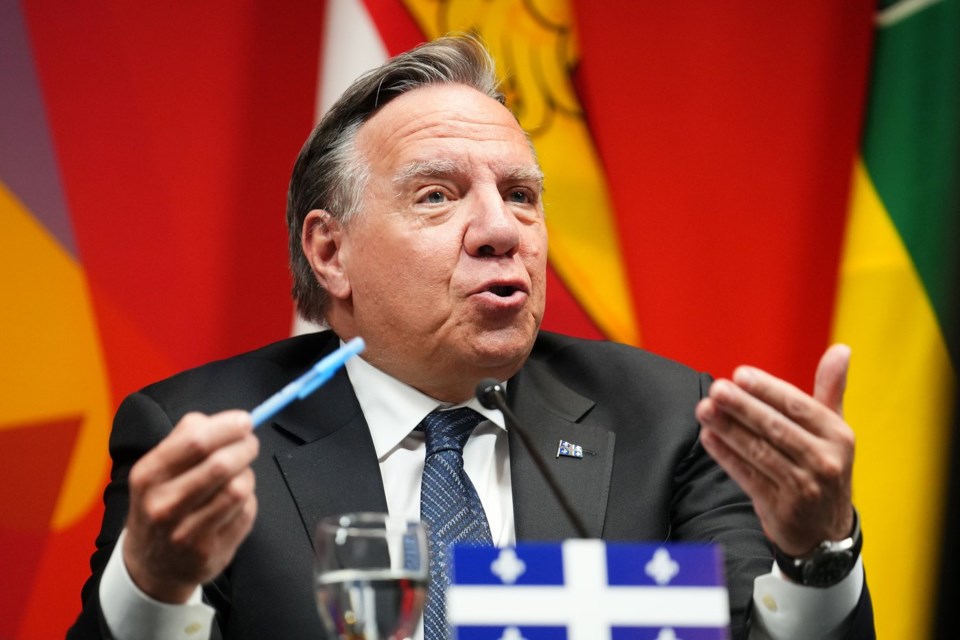MONTREAL — Quebec Premier François Legault welcomed news that Canada would not be hit with United States tariffs for another month, but he said Monday that uncertainty continues to hang over the economy like a "dagger over our heads."
Canada may not be hit just yet with 25 per cent tariffs by U.S. President Donald Trump, but companies in Quebec are already feeling the impact of his threats — many are choosing to put projects on hold, waiting to see what he will do, Legault told reporters Monday evening in Montreal.
"Sometimes it's better to get bad news than to have uncertainty," the premier said after meeting with several of the province's financial heavyweights as his administration readied its response to the looming tariffs.
Moments earlier, Trump said he wouldn't impose tariffs on Canada for another month, pulling back from a plan that would have tipped North America into a trade war on Tuesday. The president announced the same 30-day reprieve to Mexico Monday morning.
But while Trump's decision is good news, the ongoing trade spat with the world's most-powerful country has highlighted two glaring weaknesses in the economies of Quebec and Canada: productivity is too low, and export markets aren't diversified enough — 71 per cent of Quebec's exports go to the U.S., Legault said.
The Quebec government is putting together programs to help companies grow and diversify their markets, he said, adding that the province's hydro utility will advance the timeline of major energy projects, but he didn't give details.
For now, he said, Quebec is putting on pause its plan to retaliate against the United States, which included removing American liquor from the provincially owner alcohol monopoly, and adding a 25 per cent penalty on U.S. companies that bid on government contracts.
Also, Legault said, Quebec will look for ways to reduce trade barriers with the other provinces, but he admitted doing so won't be easy in certain sectors, including construction.
Meanwhile, the tariffs may be on hold for now — Trump said he was satisfied with Prime Minister Justin Trudeau's border plan, which includes helicopter patrols, a joint Canada-U.S. organized crime task force, and the appointment of a "fentanyl czar" — but Quebec is still preparing financial aid for workers if the president changes his mind.
As well, the mayors of both Montreal and Toronto confirmed Monday that they're developing their own plans to respond to the tariffs, in partnership with other levels of government. Toronto's actions will include a review of the city's procurement plans and a buy-Canadian initiative to prioritize local goods and services, Mayor Olivia Chow said Monday.
Montreal Mayor Valérie Plante said her administration was also reviewing its list of American suppliers and looking for local and international alternatives. She said the city could potentially impose its own 25 per cent penalty on American suppliers who bid on municipal contracts. "The friendship between our nations has always been based on mutual respect," she wrote in a statement. "If Washington chooses confrontation, we will answer with the same determination."
For his party, Legault said Monday's news "is not a complete victory" because of Trump's unpredictability — and also because of how nasty and aggressive he's been, saying things like Canada isn't a "viable country" and that it should become the 51st state.
"It's terrible to hear things like that," Legault said. "We have to be ready for all types of scenarios with this guy."
This report by The Canadian Press was first published Feb. 3, 2025.
Morgan Lowrie, The Canadian Press



